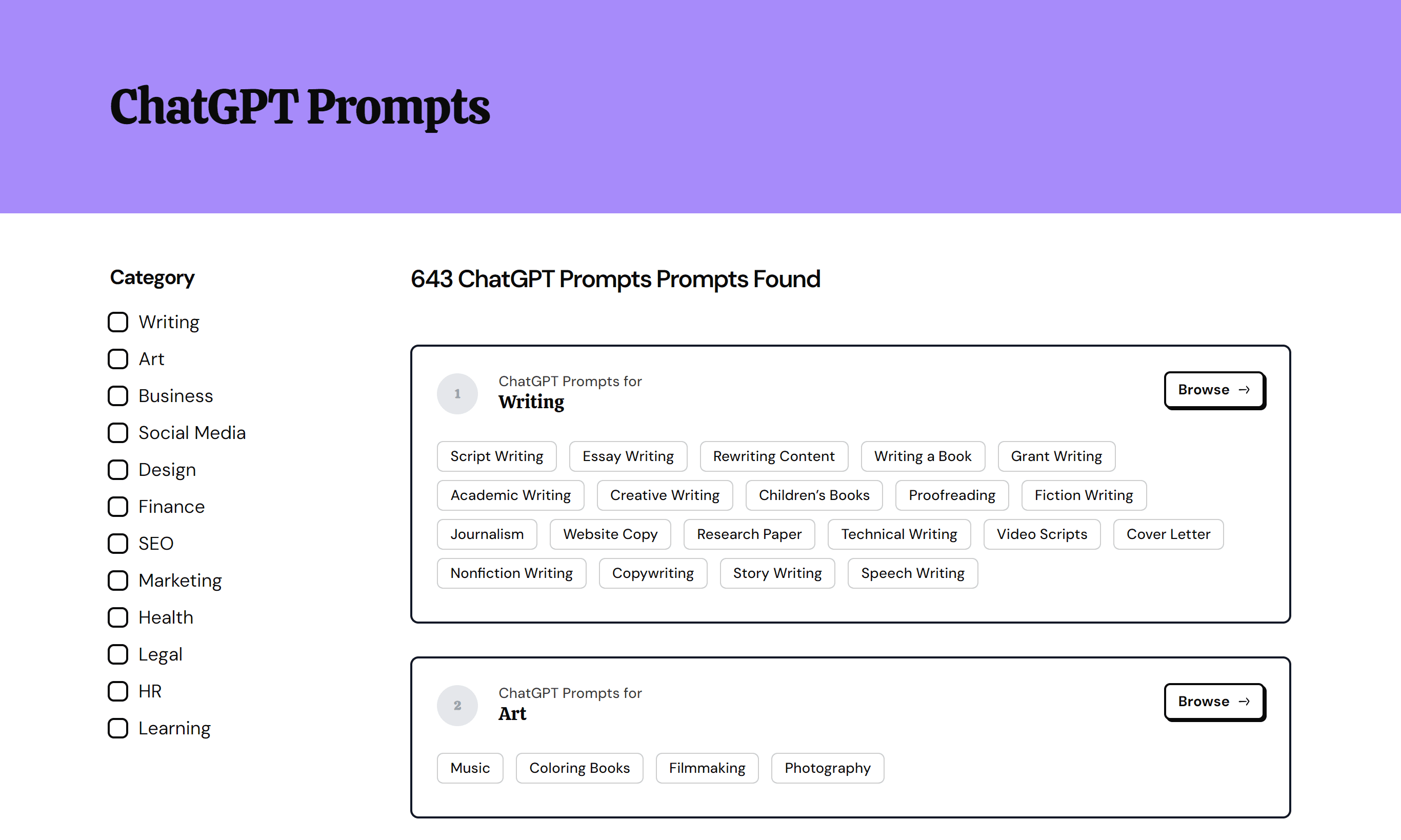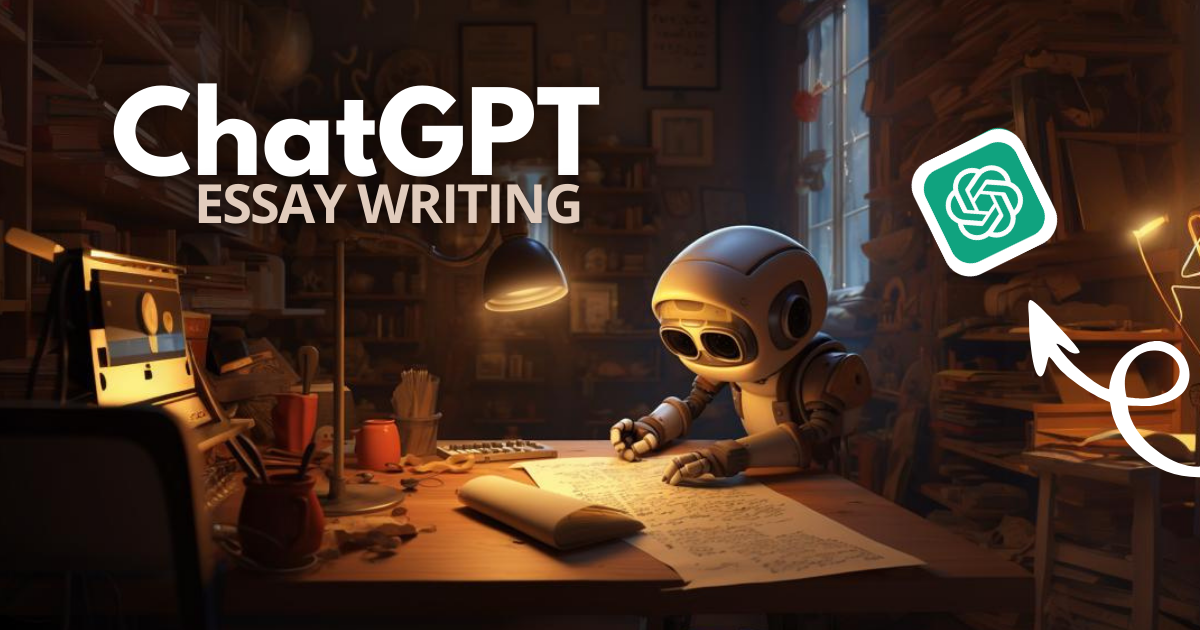Essay writing can be a daunting task.
Finding the right words, structuring your thoughts, and ensuring your arguments are compelling can often seem like climbing a mountain. But what if there was a tool to make this climb a little less steep?
As it turns out, ChatGPT is this tool. But only if you give it the right prompts.
In this post, I’m going to show you a series of ChatGPT prompts designed specifically for essay writing. These prompts will help you brainstorm ideas, structure your arguments, and even refine your language.
Be Aware!
Using ChatGPT to generate an entire essay without your input could be considered plagiarism.
These are the best ChatGPT prompts for essay writing:
- Brainstorm Essay Topics
- Develop Thesis Statement
- Create Outline
- Find Credible Sources
- Explain Complex Topics
- Draft Introduction
- Write Concluding Statements
- Improve Vocabulary
- Check Reference Formatting
- Edit & Proofread
In the next section, we'll take a closer look at each aspect of essay writing (along with the prompt examples). And if you read till the end, you'll also find a tip to use these prompts more effectively.
Chat GPT Prompts for Essay Writing
In this section, I'm going to provide you with a comprehensive guide of prompts that can take your essay from simple to sophisticated, helping you communicate your ideas more effectively.
Looking for AI To Write an Essay?
Our partners at AI Writing Space reviewed the best AI tools for writing essays.
1. To Brainstorm Essay Topics
The toughest part of writing an essay can often be simply deciding what to write about. But, with the help of the first prompt, brainstorming can become a breeze.
As an expert in brainstorming, you are required to generate a diverse range of potential essay topics on a given [topic]. The essay topics should cater to a broad spectrum of perspectives and should be thought-provoking, original, and engaging. Each topic should also be specific enough to provide a clear direction for the essay. Provide a brief explanation for each suggested topic to illustrate its potential depth and relevance.This prompt was generated by our ChatGPT prompt generator.
2. To Develop Thesis Statement
The thesis statement provides a clear, concise viewpoint that your paper will support. Using the next prompt, ChatGPT will craft a thesis statement that achieves exactly that.
As a high-achieving student, you are expected to brainstorm a list of potential essay topics on a specified [subject]. The topics should be original, intellectually stimulating, and capable of being explored in-depth. They should allow for the construction of logical arguments supported by substantial evidence. Ensure the topics fall within the guidelines and scope of the assignment, and that they are likely to earn you the top grades you are accustomed to. The topics should showcase your critical thinking skills, creativity, and profound understanding of the subject.This prompt was generated by our ChatGPT prompt generator.
3. To Create Outline
The next prompt we'll take a look at is for creating an outline. Because as we know, the outline is an essential step in producing a compelling essay. It gives structure to your thoughts and makes your writing process smoother.
As an experienced essay writer, create an in-depth and well-structured outline for an essay on a specified topic. The outline should include an introduction, body paragraphs, and a conclusion. Each section should have a brief description of the main points or arguments that will be discussed. The outline should also include a thesis statement and ensure that the arguments presented support it. The outline should be clear, concise, and easy to follow, setting a strong foundation for the essay.This prompt was generated by our ChatGPT prompt generator.
4. To Find Credible Sources
When writing an essay, the credibility of your sources can make or break your argument. It's crucial to find reliable and respected sources of information. With the following prompt, this task becomes much easier.
Act as an experienced researcher. Your task is to find credible sources on [topic]. The sources should be reputable, reliable, and relevant to the topic. These can be from books, scholarly articles, reputable news outlets, or official websites. Avoid using sources that are outdated, biased, or lack credibility. Make sure to compile these sources into an organized list, complete with the necessary citation information. This will be used to strengthen the credibility of an upcoming research paper.This prompt was generated by our ChatGPT prompt generator.
5. To Explain Complex Topics
With the next prompt, you'll be able to simplify and learn complex issues in a way that's easily digestible for you or your readers.
As a teacher with 50 years of experience, your task is to help me understand [topic]. Your approach should be patient, clear, and comprehensive, breaking the topic down into easily digestible parts. Use your wealth of experience to provide real-world examples where appropriate, and use different teaching strategies to cater to various learning styles. Encourage questions to ensure understanding and promote active learning. Provide resources for further study and practice if applicable.This prompt was generated by our ChatGPT prompt generator.
6. To Draft Introduction
The introduction sets the stage for your entire essay. It's where you hook your reader and lay the groundwork for your argument. And with the next prompt, drafting an introduction is no longer a burden.
Act as an experienced essay writer. Write a compelling introduction for an essay on the given [topic]. The intro should be engaging, thought-provoking, and give a clear idea about the essay's main argument. It should draw the reader in and make them want to read the rest of the essay. Use a hook to grab the reader's attention and include a clear thesis statement. Ensure the introduction is clear, concise, and adheres to the appropriate academic writing style and formatting guidelines.This prompt was generated by our ChatGPT prompt generator.
7. To Write Concluding Statements
Concluding statements tie together all of your points and leave your readers with something to think about. And that's exactly what the next prompt is designed for.
As an experienced essay writer, your task is to write concluding statements for an essay on a specified [topic]. The conclusion should succinctly summarize the main points argued in the essay, reaffirm the thesis statement, and provide a sense of closure. Ensure that the conclusion provides a clear and persuasive ending to the essay, leaving the reader with a final impression of the arguments made. If possible, propose further implications or thought-provoking questions related to the topic to encourage the reader to continue thinking about the subject. The conclusion should align with the overall tone and style of the essay.This prompt was generated by our ChatGPT prompt generator.
8. To Improve Vocabulary
An essay isn't just about ideas. It's about how you communicate those ideas. That's why having a strong and varied vocabulary is so important. The next prompt will help you achieve this.
As an experienced essay writer, your task is to enhance the vocabulary of the given [text]. The objective is to make the text more engaging and intellectual without losing its original meaning. Replace simple or commonly used words with more sophisticated synonyms where appropriate. Also, ensure that the new words used are contextually correct. The improved vocabulary should add depth to the text and make it more appealing to the target audience.This prompt was generated by our ChatGPT prompt generator.
9. To Check Reference Formatting
Ensuring your references are correctly formatted is a crucial part of essay writing. It's not just about giving credit where it's due, it's also about maintaining the integrity of your work.
If you're not sure how to do this properly, just use the prompt below.
Act as an experienced essay writer. Review the given [text] to ensure it adheres to the correct formatting style required. This includes checking the layout, citations, reference list, and overall structure of the essay. Identify any inconsistencies or errors, and provide clear, detailed feedback on how to correct them. Ensure that the essay adheres to the guidelines of the chosen writing style, such as APA, MLA, or Chicago style, and meets academic standards.This prompt was generated by our ChatGPT prompt generator.
10. To Edit & Proofread
The last prompt we'll take a look at is for proofreading. Because as we know, proofreading is the make-or-break stage in essay writing. It's all about bringing that final polish and catching any errors you might have missed.
And if you don't have anyone to proofread your text for you. Just submit your essay to ChatGPT and use the prompt below.
As an experienced essay writer, review and proofread the provided essay text. Ensure that the essay is coherent, logical, and engaging. Check for any grammatical, spelling, punctuation, or syntax errors and correct them. Review the overall structure of the essay and make sure the argument is clear and well-supported with evidence. Provide feedback and suggestions to improve the essay's overall quality, readability, and effectiveness.This prompt was generated by our ChatGPT prompt generator.
How to Use These Prompts Effectively
The prompts I mentioned today are also available in our FREE prompt directory. You can check them out here: ChatGPT prompts.

How To Generate Custom Prompts
Didn't find the prompt you need? Try our FREE ChatGPT Prompt Generator to generate one for you!

Final Thoughts
The prompts I've shared in this post are designed to help you structure your thoughts, generate ideas, and ultimately, produce a more compelling essay.
These prompts can be a game-changer, making the writing process more manageable and less overwhelming. So, use these prompts in your next assignment and see how they transform your approach to essay writing.
Remember, a well-structured essay is not just about getting good grades, it's a reflection of your critical thinking and communication skills.
FAQ
Let's also address some of the common questions about using ChatGPT for essay writing.
Can I use ChatGPT to write my essay?
Yes, you can use ChatGPT to write your essay. It can help in brainstorming ideas, structuring your essay, and even generating content. However, remember that it's essential to review and edit the content to ensure it meets your specific requirements and academic standards.
Can you use ChatGPT to write essays without plagiarizing?
Yes, you can use ChatGPT to assist in writing essays without plagiarizing. ChatGPT generates unique ideas in a clear and compelling manner. However, remember that it's essential to always cross-check generated content for originality and accuracy.
Can ChatGPT be detected if you paraphrase?
Yes, it's possible to detect the use of ChatGPT even when the output has been paraphrased. This is because AI-generated content often has distinct patterns or styles that can be recognized.
Is it illegal to use AI to write an essay?
No, it's not illegal to use ChatGPT, to write an essay. However, it's important to remember that the work should be your own. Using ChatGPT to generate an entire essay without your input could be considered plagiarism.

